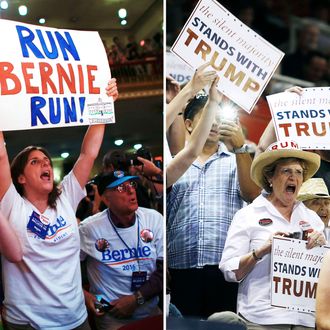
The message for the second night of the Republican National Convention is officially “Make America Work Again,” but the more detailed description makes it clear it’s Economy Night: >
The Obama years have delivered anemic economic growth, the lowest labor-force participation rate in 38 years, and job-killing regulations and legislation like Obamacare. These policies are crushing middle-class families, and a Hillary Clinton presidency would merely be an Obama third term that would deliver the same poor results. Donald Trump is a successful businessman with a solid record of creating jobs and the experience we need to get America’s economy up and running … and get Americans working again.
The message for the second night of the Republican National Convention is officially “Make America Work Again,” but the more detailed description makes it clear it’s Economy Night: >
Perusing the speakers list for tonight, it’s a bit hard to identify anyone poised to articulate a distinctively Trumpian view of the economy. Maybe Tiffany Trump? Perhaps Kerry Woolard, who runs the mogul’s winery? Could it be Ultimate Fighting Championship president Dana White?
Whoever it is, you’d figure a key strategic objective of Economy Night would be to appeal to disgruntled Bernie Sanders voters — you know, those fellow populists with common roots among the sons and daughters of toil in the white working class. Trump has himself made the pitch to these folks, so he clearly thinks it’s feasible and advisable.
But anyone expecting this to work might want to check out some new findings from Brookings and the Public Religion Research Institute, as explained by PRRI’s board chairman at the Washington Post’s Monkey Cage blog today. Here’s a key nugget:
Both Sanders and Trump supporters say they are concerned about jobs and unemployment. But their preferred policy solutions will be quite different, considering their very different ideological makeup.
Approximately half (49 percent) of Trump supporters describe themselves as very conservative or conservative. Not surprisingly, only 23 percent are strongly in favor of raising taxes on wealthy people and corporations in order to invest in education and infrastructure as a way to improve the economy.
By contrast, only 10 percent of Sanders’s backers consider themselves conservative — and fully 60 percent want to tax the rich for those economic stimulus efforts, supported by left-of-center figures like Sanders.
Both bands of “populists” hate trade agreements, though, right? Yes, but with significantly variable degrees of intensity. There appears to be some common sentiment on trade, although Sanders supporters aren’t as dedicated to that stance as Trump supporters:
Neither group of supporters considers trade agreements to be a particularly salient issue to them personally — although, again, more Trump supporters than Sanders supporters consider it a priority. Roughly one in three Trump supporters (36 percent) say such agreements are a critical issue; fewer than one in four Sanders supporters (23 percent) say that.
Sources
Washington PostIt will be fun to see if tonight’s speakers can vary their pitch enough from the first night’s rage-fest to send a valentine or two to those still feeling, but soon to be missing, the Bern. Or maybe Team Trump thinks Clinton-hating is enough.






























